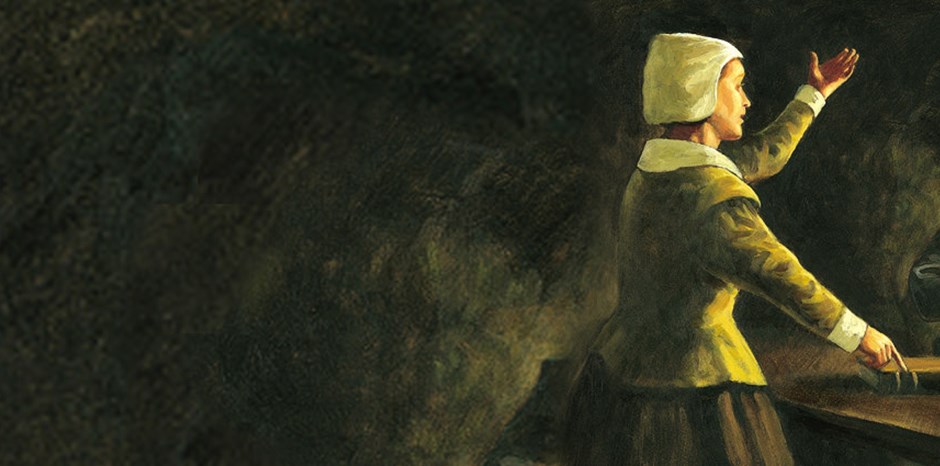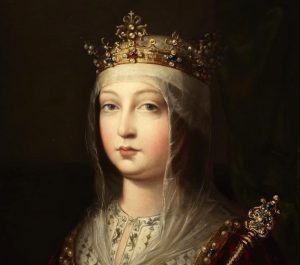For centuries women have fought against numerous injustices forced upon them because of their gender. Some of these injustices include the right to be seen as an equal to men, the right to vote, and the right for equal pay, along with many more. Although women have succeeded in breaking down some of these barriers, there are still many inequalities being fought today. During the seventeenth century, there was one woman in particular who battled in opposition to social injustice: Anne Hutchinson. This article is about the life of a brave woman who opposed an unfair law forbidding men and women from freely practicing their religion, and who also challenged the preposterous roles women were limited to in the religious community.

Anne Hutchinson, maiden name Anne Marbury, was born July 20, 1591, in Alford, England. She was the daughter of a midwife and a Cambridge scholar who published many unorthodox religious texts. In fact, Francis Marbury’s teachings were banned from where he was a teacher, at Saint Wilfred’s School in Alford. After vigorous pleading, Marbury was able to have the ban lifted, and he began teaching again in 1602. 1 Perhaps this is where Anne inherited her tenacious spirit to express her opinion. In 1605, at the young age of fourteen, Anne and her family moved to London for her father’s new position as rector of Saint Martin’s Vintry, leaving behind Anne’s boyfriend, a tailor named William Hutchinson. After the death of Anne’s father in 1611, Hutchinson moved to London to be with Anne; the next year the two were married. That same year, the newlywed bride returned to Alford where her husband continued his tailor business, and Anne followed in her mother’s footsteps as a midwife. Anne and William went on to raise thirteen children together in Alford. 2
In 1612, newly ordained Puritan minister John Cotton began preaching at Saint Botolph’s Church in Boston, Lincolnshire, not far from Alford where Anne Hutchinson resided. His unique approach greatly intrigued Hutchinson. 3 Cotton’s preaching and his understandings of religion reminded Anne of her father’s teachings. Anne enjoyed Cotton’s work so much, that in 1633, when Cotton immigrated to New England, Anne convinced her husband to move there as well. In 1634, Anne and her family made the long transition to Massachusetts. 4
The following year, in 1635, Hutchinson began holding weekly gatherings in her home to discuss minister Cotton’s sermons. Anne and her followers addressed their beliefs of sheer grace as opposed to the Calvinist theological viewpoint of predestination. Hutchinson and her followers believed that God alone grants salvation to whomever He believes is worthy of His grace, without human interaction. The clergy in New England taught that people could gain God’s grace by willingly performing various covenant conditions, such as performing good deeds, reciting prayers, attending church, along with other forms of religious practice. 5 Anne’s critics called her teachings Antinomianism. The Greek word is translated as “hostile to the law.” Anne provoked the colony leaders by proclaiming that members of their clergy who had not undergone a conversion experience had no authority to be held responsible for the spiritual offices of the colony. She also brought attention to the common yet unfair assumptions of women’s roles within Puritan society. 6 Anne’s following continued to grow, and it became so significant that in the 1636 governor’s election, the colony prevented the reelection of the current governor John Winthrop, and elected Sir Henry Vane the Younger into office. Sir Henry was an outspoken supporter of Anne’s movement, and he was a strong supporter of the anti-Winthrop movement.

Anne’s rising popularity caused three major problems for the colonial leaders. First, Anne’s gatherings paralleled preaching, which was strictly limited to those with a licence, and was absolutely forbidden to women. Second, the New England clergy was putting forth great effort in order to establish a unified church. Anne’s teachings contradicted their efforts. Third, Anne’s supporters consisted of both men and women. This act challenged the status quo of men being the only influential figures within society. 7 Never before had a woman caused so much trouble for authority figures, nor had a woman been the leader of a huge support of individuals.
The turning point of Anne’s momentum occurred during the governor election in May 1637, when former governor John Winthrop was reelected to office. It is not difficult to understand why Winthrop put Hutchinson on trial for heresy when he took office in November. 8 Winthrop was desperate to regain social order within the colony. The trial was held publicly to make an example out of Hutchinson, to show what happens to those who oppose the church and therefore oppose the colonial leadership. Anne surprised many with her witty banter and intellectual remarks. She defended herself quite impressively, proving her knowledge of the Bible and religious laws, and also by providing evidence demonstrating that her accused charge was based on more circumstantial evidence than proven facts of illegal activity. For example, the court tried to charge her with sedition, or an action suggesting discontent or rebellious actions against the government. Hutchinson made it clear that expressing opinions and holding conversations within a women’s meeting was not an illegal act. The statements made within those meetings were confidential because they were held in the privacy of her home. The spectacle of a self-educated woman verbally battling a governor who was a Cambridge scholar on an equal level was unheard of. Despite Hutchinson’s efforts, she was still convicted and banished from the colony. Anne was at a disadvantage from the start with civil officers, elected deputies, and clergymen represented as the jury in the trial. 9 After the verdict, Anne, her family, and a few loyal followers migrated to Rhode Island for a short while before settling in the Dutch colony of New Netherlands, which subsequently became New York. In 1643, Anne and her family became victims of an Indian uprising and were killed during the attack.

Anne Hutchinson is seen as one of the first female feminist who fought for religious freedom. Anne’s actions represent a right established to us as Americans in 1791. The first amendment to the Constitution established the freedoms of religion, assembly, speech, press, and petition. Anne’s reasons for refusing to conform to colonial authorities were reasonable and respectable. She was not the only person to fight for individual freedoms; but her courageous start led the way for others to fight against injustices too.
- John R. Holmes, “Anne Hutchinson,” Salem Press Biographical Encyclopedia (January 2016), 1. ↵
- Holmes, “Anne Hutchinson,” 1. ↵
- Francis J. Bremer, “John Cotton,” Salem Press Biographical Encyclopedia (2016), 1. ↵
- Holmes, “Anne Hutchinson,” 1. ↵
- James F. Cooper, Jr., “Anne Hutchinson and the ‘Lay Rebellion’ against the Clergy,” The New England Quarterly, Inc 61, no. 3 (September 1988): 382-383. ↵
- Alan Brinkley, American History, 15th ed., vol. 1: to 1865 (2 Penn Plaza, New York, NY 10121: McGraw Hill Education, 2015), 45. ↵
- Holmes, “Anne Hutchinson,” 1. ↵
- Alan Brinkley, American History, 45. ↵
- Lisa McGunigal, “The Criminal Trial of Anne Hutchinson: Ritual, Religion, and Law,” Mosaic: A Journal for the Interdisciplinary Study of Literature 49, no. 2 (June 2016): 1-8. ↵



133 comments
Vianey Centeno
Such a well-written piece, I must say! You did Anne Hutchinson and her desire for justice and human rights proud. I’ve always thought Anne Hutchinson was a significant figure in American history, but regrettably she is not well-known. Her passing was incredibly terrible, and there is no way to know how much more she may have achieved and fought for if she had lived longer.
Brandon Vasquez
The beginning of this article really drew me in as someone who has not really read many articles on a topic like this. I was also not too familiar with who Anne Hutchinson up until I read this article however, the introduction of her and her life before diving into the main point of the article really helped me understand where she was coming from more.
Lana Garcia
The timeline of this article was beautifully written. It was cohesive and easy to follow, which I love. I love how you mentioned her possibly getting her voice from her father. It was a beautiful insight. The romantic in me loved reading about when and how she ended up with her husband. You did an excellent job at describing Anne’s powerful voice and the impact she had then and now.
Brandon Vasquez
The beginning of this article really drew me in as someone who has not really read many articles on a topic like this. I was also not too familiar with who Anne Hutchinson up to this point however, the introduction of her and her life before diving into the main point of the article really helped me understand where she was coming from more.
Elena Montiel
I really enjoyed the illustration, it really shows the impact she had on people. I also enjoyed that the article mentions that she was a midwife but also self-educated and loved to educate other people as well. It was interesting to read about how she challenged Winthrop in court in order to fight for what she believes in and came prepared with laws and facts in order to defend herself.
Eugenio Gonzalez
Fascinating article; before reading the article, I had heard about Anne Hutchinson, but I never knew who she was. The article does an excellent job of introducing us to Anne Hutchinson. After reading the article, I was impressed with Anne Hutchinson’s leadership because she inspired many in the New England colony. I was also impressed with Anne Hutchinson’s character as she stood up for what she believed and did not care to go toe to toe with the governor of New England.
Kimberly Rivera
A lovely article with a strong and on point story line. I enjoyed reading about Hutchison and how no matter what dangers she could have faced she stayed strong and defended not only her beliefs but herself while using logic. Your style of writing made it easier for me to read the story and be immersed into it some thing i truly enjoyed experiencing.
Emily Rodriguez
This was a very compelling article that told a great story of Anne Hutchinson. The pictures used in the article were perfect additions to show the readers the power Hutchinson had in her time. The article was extremely informative and kept the reader engaged throughout the article. There was a good amount of scholarly sources for such a short article. Before reading this article, I did not know much about her. I believe this article was a strong introduction to her and gave the reader a detailed explanation of her movement.
Rosa Deyo
This is such a well-written article! You really did Anne Hutchinson and her drive for human rights justice. I’ve always believed that Anne Hutchinson was a critical part of American history, yet sadly she is not commonly talked about. Her death was truly tragic, and there I no way of telling how much more she could have accomplished and advocated for if she were to have lived longer.
Kelly Arevalo
Good article! I like how Hutchinson was able to stand up for her beliefs and freedom of speech. It was really an advance for women. I like how you casually mentioned the number of children she had, I know it’s not relevant to the story you are telling but it is still impressive how she defended her religious beliefs and held weekly meetings while having such responsibility.
Nice job!